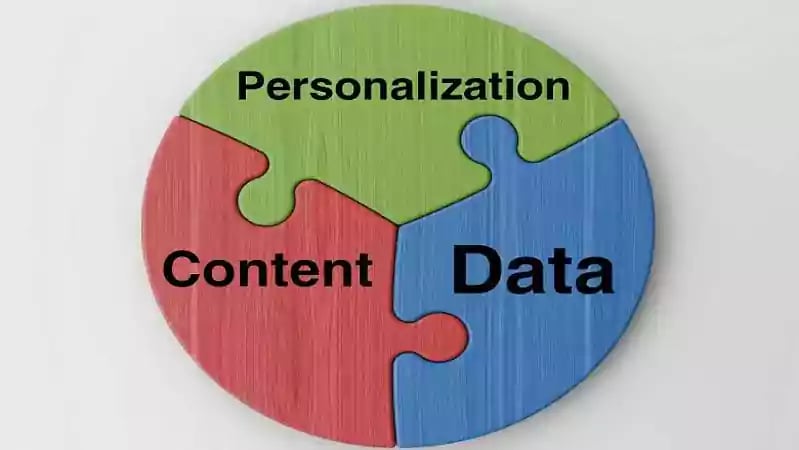Propulsez votre contenu avec HubSpot Marketing Hub. Stratégies et outils pour booster votre réussite.
Les principales tendances du marketing de contenu pour 2025
À l'approche de la fin de l'année, les spécialistes du marketing trouvent de nouveaux moyens d'attirer et de fidéliser les consommateurs actuels et potentiels. Se tenir au courant des nouveautés et des évolutions permet de s'assurer que les stratégies sont actuelles et influentes. Alors que nous nous tournons vers l'avenir, nous observons déjà certaines tendances dans le domaine du marketing; choisissons le contenu comme l'un des principaux piliers du marketing.

Nous nous sommes penchés sur le marketing de contenu et sur le fait qu'il s'agit d'attirer et d'engager vos consommateurs potentiels en les informant au moyen d'un contenu de haute qualité. Le marketing de contenu est non seulement un outil puissant pour stimuler les ventes et la croissance de l'entreprise, mais il vous permet également d'établir la confiance et de construire des liens significatifs avec votre public en fournissant des solutions précieuses à leurs problèmes. Avec l'évolution constante des technologies innovantes et des canaux de communication, le marketing de contenu ne montre aucun signe de ralentissement de sitôt.
#1 Mettez votre stratégie en place.
Stratégie de contenu
À première vue, cela peut sembler évident ; cependant, les chiffres suggèrent le contraire. En 2017, une enquête menée par le Content Marketing Institute a conclu qu'un pourcentage stupéfiant de 63 % des entreprises qui utilisent le marketing de contenu n'ont pas de véritable stratégie. Cela signifie que
plus de la moitié du contenu diffusé n'est pas de qualité et n'a d'autre but que de gonfler le nombre de pages de l'entreprise.
C'est une terrible nouvelle pour ces entreprises, mais une excellente nouvelle pour vous. Faites vos recherches, regardez les sites de vos concurrents et essayez de trouver la stratégie qui se cache derrière leur contenu. Il y a de fortes chances qu'il n'y en ait pas, alors prenez certains des sujets qu'ils traitent et faites-en de meilleurs.
Une stratégie fondée sur les données
Les données sont devenues plus précieuses que jamais dans le domaine du marketing de contenu. Le succès de votre création de contenu n'est pas laissé au hasard, mais résulte plutôt de la recherche de ce qui fonctionne et de ce qui ne fonctionne pas. Grâce à de nombreux outils analytiques, les spécialistes du marketing peuvent évaluer leur stratégie de contenu de manière cohérente. Le blogging est un élément essentiel d'une stratégie solide. En analysant les indicateurs de performance tels que le taux de rebond, le temps de consultation des pages et les entrées, les spécialistes du marketing peuvent se faire une idée de la manière d'affiner le contenu futur. Les données qui sous-tendent le marketing de contenu offrent une perspective unique sur l'état d'esprit du consommateur potentiel et contribuent à le pousser à l'achat.
#2 Tirer parti des chatbots et de l'intelligence artificielle.
L'intelligence artificielle est de plus en plus utilisée par presque toutes les entreprises, que vous le sachiez ou non. Elle permet d'améliorer les résultats de votre entreprise et d'allouer votre temps de manière plus efficace. Par exemple, les chatbots étaient autrefois perçus de manière négative lorsqu'ils apparaissaient sur un site web. Ce n'est plus le cas aujourd'hui. Devriez-vous envisager de mettre en œuvre un chatbot IA?
Les chatbots ont parcouru un long chemin depuis le tout nouveau chatbot appelé ELIZA en 1966. Créé par Joseph Weizenbaum, ce chatbot a jeté les bases des innovations futures en utilisant des réponses, des phrases et des mots clés préprogrammés (bien qu'il n'ait pas passé le test de Turing, c'est-à-dire le test qui consiste à faire croire aux utilisateurs qu'ils interagissent avec une personne réelle). Quelques décennies plus tard, les interfaces d'IA telles que Siri, Alexa et Google appartiennent désormais au passé, et l'IA générative, ChatGPT, Bard et compagnie sont omniprésents.
Les chatbots, les outils de publication automatisée et autres sont prêts à révolutionner le monde du marketing de contenu, comme ils l'ont fait pour le service client et d'autres domaines. Ces outils ne vont pas vous remplacer, vous ou votre équipe, de sitôt. Ils rendront votre travail beaucoup plus accessible en vous déchargeant des tâches routinières, banales et répétitives afin que vous puissiez vous concentrer sur l'aspect créatif.
Les technologies qui sous-tendent l'IA, en particulier le "traitement du langage naturel", ChatGPT, Bard et compagnie, ont progressé de telle sorte que les interactions transactionnelles et de type FAQ peuvent être entièrement automatisées. Souvent, le client ne se rend même pas compte qu'il parle à un robot.
La génération de contenu assistée par l'IA n'existait pas encore en 2022 ; vous êtes à la traîne si vous n'intégrez pas l'IA dans vos efforts de création aujourd'hui.
A découvrir également: cet article
#3 Créez de l'autorité avec des groupes de sujets.
Les groupes de sujets sont devenus une partie essentielle du référencement ; les stratégies de contenu définissent des sujets spécifiques avec des mots-clés pertinents pour une page pilier particulière.
Ce changement est dû à la manière dont les internautes effectuent des recherches sur Google et d'autres moteurs de recherche. Autrefois, les internautes ne cherchaient qu'un ou deux mots dans une barre de recherche, par exemple "Hôtel en Floride". Aujourd'hui, les internautes recherchent des expressions plus précises telles que "Quel est le meilleur hôtel de Floride ?". Les spécialistes du marketing doivent s'assurer qu'ils ne se contentent pas d'écrire sur un seul sujet et d'insérer autant de mots clés que possible.
Il s'agit de décomposer un sujet en plusieurs sous-catégories afin de créer un contenu efficace qui satisfera les algorithmes des moteurs de recherche et répondra à la question ou résoudra le problème du visiteur du site web.
#4 Soyez adapté aux mobiles.
En étroite relation avec le dernier point, de plus en plus de personnes utilisent des appareils mobiles comme principal moyen d'accès à l'internet (du moins pour un usage non professionnel). Tout en optimisant votre contenu pour faciliter la recherche vocale, veillez à ce qu'il s'affiche correctement sur des écrans plus petits - ce qui vous vaudra un bonus puisque Google classe mieux les sites adaptés aux mobiles.
#5. Personnalisez et engagez-vous.
Les personnes qui visitent votre site ou qui s'engagent avec votre entreprise veulent se sentir spéciales. Comme nous l'avons vu plus haut, ils ne veulent pas qu'un chatbot leur donne une réponse superficielle qui laisse beaucoup de zones d'ombre et qui laisse à désirer. La manière dont le contenu devient interactif et personnel est cruciale pour engager le dialogue avec les consommateurs potentiels. Par exemple, selon WhiskData, le taux d'ouverture des courriels dont l'objet est personnalisé (par exemple, en incluant le prénom du destinataire) augmente de 26 %. Cela montre que la personnalisation peut contribuer grandement à attirer l'attention de quelqu'un ! Nous constatons que les spécialistes du marketing portent l'interaction avec les consommateurs à un niveau supérieur, ce qui profite aux deux parties. Les sondages et les enquêtes sont un excellent moyen d'engager le dialogue, car vous ne vous contentez pas d'attirer l'attention d'un visiteur, vous obtenez également ses coordonnées et des données précieuses. Cela peut vous aider à recibler votre consommateur pour continuer à lui fournir le contenu qu'il souhaite.
#6 : Adoptez une approche omnicanale.
L'omnicanalité consiste à intégrer votre présence sur les médias sociaux, sur votre site et partout où vous existez dans le monde virtuel. Veillez à ce que la voix de votre marque soit cohérente sur tous les canaux, à ce que votre logo soit le même et facilement identifiable quelle que soit la taille de l'écran, et à ce que vous établissiez toujours des liens vers les bons endroits. Vous avez pensé à expérimenter un podcast ou une diffusion en direct ? C'est le moment de le faire !
Jetez un coup d'œil à la vidéo.
La disponibilité croissante de connexions à large bande, en particulier à partir d'appareils mobiles, a entraîné une augmentation corrélative du contenu vidéo . Les gens aiment se divertir, et lorsqu'ils sont assis dans le bus ou à l'heure du déjeuner et qu'ils regardent leur téléphone, cela signifie de plus en plus qu'ils aiment les vidéos.
N'oubliez pas de faire court et d'aller à l'essentiel. Les gens regardent des vidéos pour éviter de s'ennuyer, alors ne les ennuyez pas avec un contenu vidéo trop long. Même si vous n'êtes pas intéressé par la réalisation de vos vidéos, pensez à les intégrer à votre contenu.
Écoutez la recherche vocale.
Avec l'utilisation croissante des assistants vocaux, de plus en plus de consommateurs utilisent la recherche vocale pour leurs besoins en ligne. Cela signifie que les entreprises ne doivent pas se contenter de prêter attention aux mots clés à longue traîne, car ils sont construits sur la base de données historiques de recherche textuelle et non sur la façon dont les gens parlent dans le monde réel. Cela signifie qu'il faut optimiser votre référencement pour les phrases grammaticalement incorrectes que les gens utiliseront lorsqu'ils demanderont à Siri de trouver des informations.
#7 : Prouvez votre valeur.
Les indicateurs sont de plus en plus nombreux et, comme de plus en plus d'entreprises souhaitent lier directement les résultats de leur chiffre d'affaires à leurs efforts de marketing de contenu, ils n'ont jamais été aussi essentiels pour le spécialiste du marketing de contenu. La notoriété de la marque est toujours un élément à prendre en compte, mais elle n'est plus la panacée qu'elle était auparavant. Désormais, vous disposez de données complexes pour étayer vos affirmations sur la valeur des efforts de votre équipe. Les engagements et les interactions sont les indicateurs de choix pour l'avenir.
#8 : Remarketing pour améliorer les conversions.
Lorsque quelqu'un visite votre site, le cookie contient des informations sur l'article spécifique qu'il a lu et sur les termes qu'il a recherchés pour y parvenir. Ensuite, si vous participez à un programme de remarketing, des publicités pour d'autres contenus liés à l'article initial lui seront présentées.
Il est important de se rappeler qu'en moyenne, 6 à 8 contacts sont nécessaires avant qu'un visiteur ordinaire ne devienne un client potentiel viable. Le remarketing est un moyen fantastique d'améliorer les conversions et d'augmenter le nombre de contacts sans trop de travail supplémentaire, puisque vous disposez déjà des données utilisateur nécessaires à la mise en place d'une campagne de remarketing.
Compte tenu de ces tendances, il manque souvent une référence aux anciennes normes qui ne vont nulle part. L'actualisation et la publication d'un nouveau contenu permanent, ainsi que l'optimisation du référencement, sont des habitudes solides qui continueront à vous servir, vous et vos efforts de marketing de contenu, à l'avenir.
L'équilibre est essentiel pour tout, et cela est tout aussi vrai pour le marketing de contenu que pour tous les autres aspects de la vie. Pour tous les articles de "trucs et astuces", vous pouvez en trouver au moins deux autres qui contredisent ce qu'ils disent. La véritable astuce consiste à trouver un équilibre entre l'essai des dernières nouveautés et le fait de s'en tenir à ce que l'on sait être efficace.
Les spécialistes du marketing disposent aujourd'hui d'innombrables possibilités pour créer une expérience attrayante pour les personnes qui entrent en contact avec leur entreprise. Des technologies de pointe comme l'IA aux stratégies basées sur les données et à la personnalisation, le marketing de contenu est une excellente base pour un retour sur investissement inégalé.
This content is also available in:
- Deutsch: Die wichtigsten Content-Marketing-Trends für 2025
- English: Top Content Marketing Trends for 2025
- Español: Principales tendencias en content marketing para 2025
- Italiano: Le principali tendenze del marketing dei contenuti per il 2025
- Română: Principalele tendințe în marketingul de conținut pentru 2025
- 简体中文: 2025 年内容营销的主要趋势










Laisser un commentaire